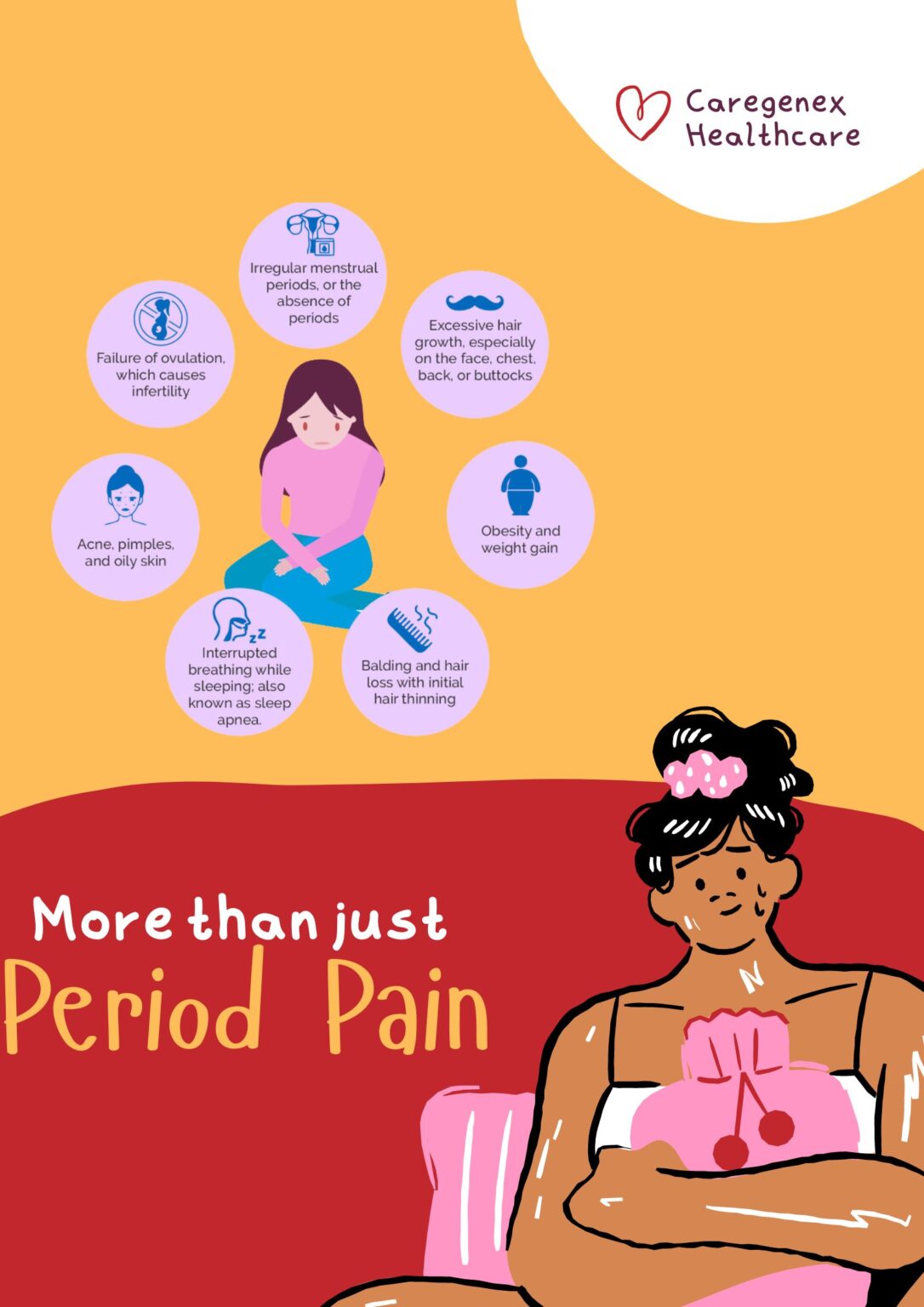
PCOS
PCOS : Symptoms and Treatment: Polycystic Ovary Syndrome (PCOS) is a common hormonal disorder affecting women of reproductive age. It’s characterized by various symptoms and can have significant impacts on a woman’s health and well-being. In this blog post, we’ll delve into what PCOS is, how to recognize its symptoms, the importance of seeking diagnosis and help, lifestyle modifications, medications, alternative therapies, Ayurvedic treatment, and surgical interventions for managing PCOS symptoms effectively.
Polycystic Ovary Syndrome (PCOS ): Symptoms :-
- What is Polycystic Ovary Syndrome (PCOS) ? is a hormonal disorder characterized by imbalances in reproductive hormones, leading to irregular menstrual cycles, ovarian cysts, and symptoms like acne and hirsutism. It can also affect fertility and increase the risk of other health complications such as diabetes and heart disease.
- Recognizing the Symptoms: PCOS symptoms can vary from woman to woman but commonly include irregular periods, excess facial and body hair, acne, and difficulty losing weight. Other symptoms may include hair loss, darkening of the skin, and infertility.
- Diagnosis and Seeking Help: Diagnosis of PCOS involves a combination of medical history, physical examination, and laboratory tests, including hormone levels and ultrasound imaging of the ovaries. It’s essential to seek help from a healthcare professional if you suspect you may have PCOS to receive proper diagnosis and treatment.
Polycystic Ovary Syndrome (PCOS): Treatments :-
- Lifestyle Modifications: Lifestyle changes play a crucial role in managing Polycystic Ovary Syndrome symptoms. This includes maintaining a healthy diet low in refined carbohydrates and sugars, engaging in regular exercise to improve insulin sensitivity and hormone balance, and managing stress through relaxation techniques such as yoga or meditation.
- Medications: Medications may be prescribed to manage Polycystic Ovary Syndrome symptoms and improve hormonal balance. This may include birth control pills to regulate menstrual cycles, anti-androgen medications to reduce symptoms like acne and hirsutism, and insulin-sensitizing agents such as metformin to address insulin resistance.
- Alternative and Complementary Therapies: Alternative therapies like acupuncture and herbal supplements may offer additional benefits in managing Polycystic Ovary Syndrome symptoms. Acupuncture can help regulate menstrual cycles and reduce stress, while herbal supplements like inositol may improve insulin sensitivity and hormone balance.
- Ayurvedic Therapy: Ayurvedic treatment for Polycystic Ovary Syndrome focuses on restoring balance to the body through dietary changes, herbal remedies, and lifestyle modifications. This may include specific dietary guidelines, herbal formulations, and practices like yoga and meditation to promote overall well-being.
- Surgical Interventions: In some cases, surgical interventions may be recommended for managing Polycystic Ovary Syndrome symptoms. This may include ovarian drilling, a minimally invasive procedure to improve ovulation, or bariatric surgery for obese women with Polycystic Ovary Syndrome (PCOS) to improve insulin sensitivity and fertility.
The Role of Yoga in Polycystic Ovary Syndrome (PCOS) Management: Yoga, an integral part of Ayurveda, offers a holistic approach to managing Polycystic Ovary Syndrome (PCOS) by combining physical postures, breathing techniques, and meditation. Here’s how Yoga can benefit women with PCOS:
- Stress Reduction: Yoga practices like meditation and deep breathing calm the nervous system, reducing stress hormones like cortisol. Lower stress levels can help regulate menstrual cycles and improve fertility.
- Hormonal Balance: Certain Yoga poses, such as Bhujangasana (Cobra Pose) and Supta Baddha Konasana (Reclining Bound Angle Pose), stimulate the ovaries and regulate hormonal secretion. These poses also improve blood circulation to the reproductive organs.
- Weight Management: Yoga promotes weight loss by increasing metabolism, burning calories, and reducing cortisol levels. Poses like Surya Namaskar (Sun Salutation) and Virabhadrasana (Warrior Pose) strengthen muscles and aid in weight management.
- Improved Sleep Quality: Polycystic Ovary Syndrome (PCOS) often disrupts sleep patterns. Yoga nidra (guided relaxation) and gentle asanas before bedtime promote deep, restorative sleep, enhancing overall well-being.
Polycystic Ovary Syndrome -is a complex condition that requires a multifaceted approach to treatment. By understanding the symptoms, seeking proper diagnosis and help, making lifestyle modifications, exploring medication options, considering alternative therapies, incorporating Ayurvedic treatment, and discussing surgical interventions when necessary, women with this can effectively manage their symptoms and improve their quality of life. It’s essential to work closely with healthcare professionals to develop a personalized treatment plan tailored to individual needs and goals.
In During this issue, need proper meditation. Women/Girls can try Ayurveda along with Yoga. These two type of remidies can much more help on this and if facing difficulty in pregnancy then it will be sure solve and can get pregnant.
This problem is a complex condition that requires a comprehensive approach to management.Ayurveda and Yoga offer natural, holistic solutions that address the underlying imbalances contributing to PCOS. By incorporating Ayurvedic remedies, dietary modifications, stress management techniques, and Yoga practices into their daily routine, women can reclaim control over their health and experience relief from Polycystic Ovary Syndrome symptoms.
Remember, every woman’s journey with Polycystic Ovary Syndrome is unique, so consult with a qualified Doctor / Ayurvedic practitioner and Yoga instructor to tailor a plan that suits your individual needs. Embrace the wisdom of Ayurveda and the healing power of Yoga to embark on a path towards hormonal balance, vitality, and well-being.
